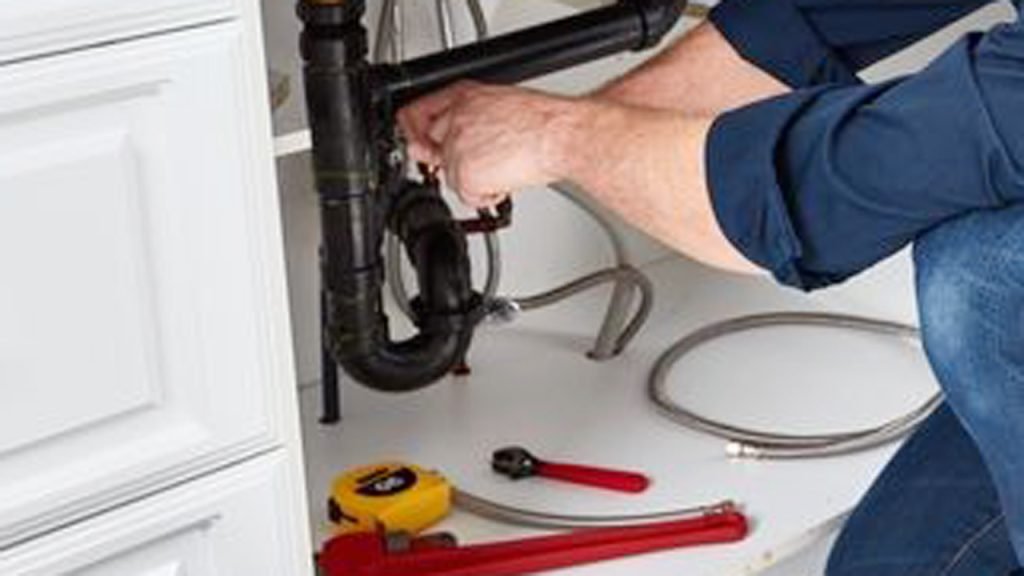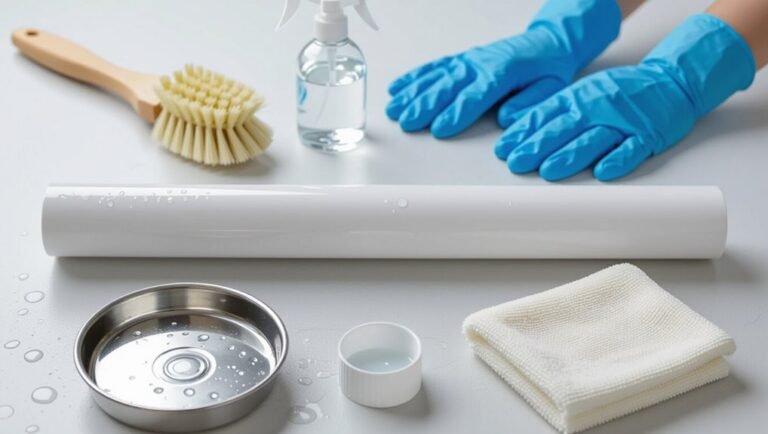What Education Is Needed to Become a Plumber?
Are you thinking about becoming a plumber? You might wonder what education is needed. To become a skilled plumber, you need formal training, hands-on experience, and specialized skills. This guide will help you understand your options for a plumbing career.
Plumbing is key to our homes, businesses, and communities. Plumbers install and fix water pipes and ensure drainage systems work right. To join this rewarding field, you need to know the education and training required.

Basics of Plumbing Career Path
Starting a plumbing career can be very rewarding. As a plumber, you’ll get to work with your hands and solve complex problems. You’ll also make a real difference in people’s lives. But first, it’s important to know the skills, aptitudes, and growth opportunities in this profession.
Skills and Aptitudes Required
Plumbers need a mix of technical skills and problem-solving abilities. Key skills include:
- Strong mechanical aptitude and dexterity
- Proficiency in reading and interpreting blueprints and technical diagrams
- Adept at troubleshooting and identifying the root cause of issues
- Ability to work safely and comply with local building codes and regulations
- Physical stamina and agility to handle the physical demands of the job
Career Growth Opportunities
The plumbing industry offers many chances for career growth. As you gain experience, you can explore different areas like:
- Residential plumbing: Focusing on installation and repair of plumbing systems in homes
- Commercial plumbing: Handling more complex plumbing systems in commercial buildings
- Industrial plumbing: Specializing in manufacturing and processing facilities
- Pipe fitting: Specializing in the installation and maintenance of industrial piping systems
Industry Overview
The plumbing industry is crucial in construction and infrastructure. Plumbers are always in demand for their expertise in ensuring water, gas, and waste flow safely and efficiently. The job outlook for plumbers is strong, with a 5% growth expected by 2029, according to the Bureau of Labor Statistics.
| Median Annual Salary | Job Outlook (2019-2029) | Educational Requirements |
|---|---|---|
| $55,160 | 5% growth | High school diploma or equivalent, plus vocational training or apprenticeship |
A plumbing career is stable and rewarding. It offers opportunities for specialization, advancement, and good income. With the right plumbing vocational training and dedication, you can start a fulfilling plumbing career path.
Here’s another post you might find useful: Is Plumbing Hard to Learn?
High School Prerequisites for Aspiring Plumbers
If you’re thinking about becoming a plumber, your high school years are key. You don’t need a college degree, but certain classes and activities can prepare you. They help you get ready for the challenges of plumbing work.
Math is very important for plumbers. You’ll learn algebra, geometry, and trigonometry. These subjects teach you how to solve problems and measure things. Physics classes also help, especially with fluid dynamics. This is crucial for understanding how water moves in pipes.
- Proficiency in mathematics, including algebra, geometry, and trigonometry
- Understanding of physics, particularly fluid dynamics
- Familiarity with technical drawing and blueprint reading
- Participation in vocational programs or shop classes for hands-on experience
Getting practical experience through vocational programs or shop classes is also great. These classes let you work with tools and learn basic plumbing skills. It’s a good way to start learning the skills you’ll need in the field.
| High School Course | Relevance to Plumbing |
|---|---|
| Mathematics (Algebra, Geometry, Trigonometry) | Crucial for understanding measurements, calculations, and problem-solving |
| Physics | Provides insights into fluid dynamics and the behavior of liquids |
| Technical Drawing/Blueprint Reading | Helps interpret and understand plumbing system designs |
| Vocational Programs/Shop Classes | Offers hands-on experience with tools and basic plumbing concepts |
By using these high school chances, you’ll be well-prepared. You’ll meet the what education is needed to become a plumber? and plumbing education requirements for a great plumbing career.
There’s more to explore! Here’s another valuable read: What to Do If a Plumber Does a Bad Job?
Trade School and Vocational Training Options
Aspiring plumbers have a clear path through trade schools and vocational training. These programs teach the skills and knowledge needed. They cover the basics and advanced techniques in plumbing.
Course Duration and Curriculum
Plumbing courses last from 6 months to 2 years. This depends on the program and its focus. Students learn in classrooms and through hands-on training. Topics include pipe fitting, valve installation, and water heater repair.
Hands-on Training Components
- Practical workshops and laboratory sessions to develop technical skills
- Simulated job-site scenarios to practice problem-solving and troubleshooting
- Internships or apprenticeship opportunities to gain real-world experience
Cost Considerations
The cost of plumbing courses varies a lot. It depends on the school, location, and program specifics. Tuition can be from $5,000 to $20,000. But, many schools help with financial aid like scholarships and loans.
Investing in a plumbing program can start a rewarding career. These programs give a strong base for future success.
What Education Is Needed to Become a Plumber?
To become a skilled plumber, you need a mix of theory and practice. There are different ways to learn plumbing, each with its own benefits. Let’s look at what education is key for plumbers.
Formal Plumbing Education
Many people go to trade schools or vocational programs to learn plumbing. These programs last 1-2 years. They teach plumbing theory, code rules, and how to fix problems.
Students learn about plumbing systems, tools, and materials. This prepares them for the plumbing world.
Plumbing Apprenticeships
Another way to become a plumber is through an apprenticeship program. Apprentices work on the job and learn in class. This way, they get paid while learning.
Apprenticeships last 4-5 years. They give a clear path to learn the trade and gain skills.
Continuing Education and Certifications
Plumbers need licenses and certifications to work legally. These include plumbing licenses, HVAC certifications, and more. They keep plumbers updated with new techniques and technologies.
The plumbing field offers many learning paths. Whether it’s formal training, an apprenticeship, or both, plumbers can have a rewarding career. They help communities by providing vital services.
Plumbing Apprenticeship Programs
Aspiring plumbers often find that plumbing apprenticeship programs offer a valuable pathway to gain the necessary skills and hands-on experience for a successful plumbing career. These programs combine classroom instruction with on-the-job training. This provides an immersive learning environment that prepares individuals for the demands of the plumbing profession.
Duration and Structure
Plumbing apprenticeship programs typically last between 4 to 5 years. During this time, apprentices receive a blend of theoretical knowledge and practical training. The structure of these programs involves a mix of classroom-based instruction and supervised work experience. This allows apprentices to apply what they’ve learned in a real-world setting.
Earning While Learning
One of the key benefits of a plumbing apprenticeship is the opportunity to earn a wage while gaining valuable skills. Apprentices are paid for their work, with wages gradually increasing as they progress through the program and demonstrate their competence.
This earn-while-you-learn approach helps alleviate the financial burden often associated with traditional educational paths.
Finding the Right Apprenticeship
- Research local plumbing companies and unions that offer apprenticeship programs.
- Attend industry events or job fairs to connect with potential apprenticeship providers.
- Reach out to your state or local workforce development agency for guidance on available plumbing apprenticeship programs.
- Consider factors like program duration, training quality, and potential for job placement when evaluating apprenticeship options.
By opting for a plumbing apprenticeship, aspiring plumbers can gain hands-on experience, earn a living wage, and lay the foundation for a rewarding plumbing career path. This innovative approach to learning and skill development has proven to be a valuable pathway for many individuals seeking to enter the dynamic and in-demand plumbing industry.
Community College Plumbing Programs and Certifications
Starting a plumbing career can be a smart move. It offers good pay, job security, and hands-on work. Community college plumbing programs are a great alternative to apprenticeships. They provide the education and training needed to become a licensed plumber, along with an associate degree.
These programs cover a lot, from basic plumbing to advanced specializations. You’ll learn about gas fitting, pipe fitting, and system design. You’ll also get hands-on experience in workshops and labs. Plus, many colleges offer plumbing license certification, boosting your job chances.
Community college programs are also affordable. They cost less than four-year universities or private trade schools. This is great for those wanting to save on student loans while getting a quality education.
Another plus is the flexibility of these programs. Many colleges offer full-time and part-time options. This is perfect for those balancing work or other commitments with school. It’s especially helpful for those changing careers to plumbing.
If you’re thinking about plumbing community college degrees, look into local programs and certifications. Community colleges can help you get the skills and credentials for a successful plumbing career.
State Licensing Requirements and Examinations
To become a licensed plumber, you must meet state requirements. This includes passing written and practical exams. The plumbing license certification ensures plumbers know their job well.
Written Test Preparation
The written exam covers many topics like plumbing codes and safety. To get ready, you’ll need to study hard. Many states offer study guides and practice tests to help.
Practical Examination Components
Plumbers also face a practical test. This test checks their hands-on skills. You might need to:
- Pipe fitting and installation
- Troubleshooting and repair of plumbing systems
- Compliance with safety protocols
- Proper use of tools and equipment
This test shows if you can use what you learned in real life.
License Renewal Requirements
After getting your license, you’ll need to renew it. This usually happens every few years. You might need to take more classes or workshops. This keeps your skills sharp and your customers happy.
| State | Written Exam Topics | Practical Exam Components | License Renewal Period |
|---|---|---|---|
| California | Plumbing codes, materials, and calculations | Pipe installation, repair, and testing | 4 years |
| Texas | Plumbing systems, safety, and customer service | Troubleshooting, fixture replacement, and code compliance | 2 years |
| New York | Plumbing design, installation, and maintenance | Welding, soldering, and pipe fitting | 3 years |
Continuing Education and Advanced Specializations
As a professional plumber, learning never stops. Continuing education and advanced specializations open new doors. They help me stay ahead in the plumbing field.
Studying topics like energy efficiency and water conservation boosts my skills. Getting certifications from groups like ASPE or IAPMO proves my expertise. This makes me more valuable to employers or clients.
Looking into specializations like commercial plumbing or HVAC-R systems can lead to better jobs. By growing my skills, I can aim for promotions and tackle bigger projects. This way, I can reach new levels in my plumbing career.
FAQ
What education is needed to become a plumber?
To become a plumber, you need formal training and hands-on experience. You’ll also need a plumbing license from your state. This includes a trade school, an apprenticeship, and passing exams.
What are the plumbing education requirements?
The education needed to be a plumber varies by state. It usually includes classroom and on-the-job training. You’ll need to finish a vocational program and then an apprenticeship to gain experience.
What kind of plumbing vocational training is available?
Plumbing vocational training is offered at trade schools and colleges. These programs mix classroom learning with hands-on training. You’ll learn about pipe fitting, system design, and code compliance.
How do plumbing apprenticeship programs work?
Plumbing apprenticeships combine work and learning. They last 4-5 years and are sponsored by unions or contractors. You’ll earn a paycheck while learning from a licensed plumber.
What kind of plumbing license or certification is required?
Licensing for plumbers varies by state. You’ll need to pass a written exam on codes and safety. A practical exam also tests your skills. You’ll need to renew your license and complete continuing education.
What kind of plumbing trade school courses are available?
Trade school programs cover pipe fitting, welding, and blueprint reading. You’ll also learn about plumbing system design and codes. Hands-on training in labs helps develop your skills.
What is the typical plumbing career path?
The career path starts with a vocational program and an apprenticeship. After becoming a journeyman plumber, you can specialize. With more experience, you can become a master plumber or start your own business.
Do community colleges offer plumbing degrees or certifications?
Yes, community colleges offer plumbing programs. These include associate’s degrees or certificates. They prepare students for entry-level jobs or further education. These programs are often more affordable.



